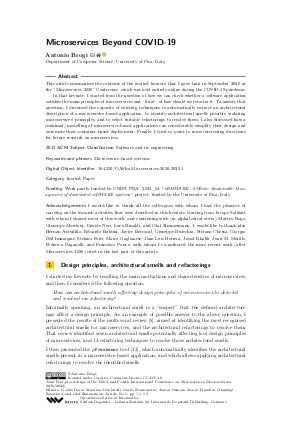Microservices Beyond COVID-19 (Invited Paper)
Author
Antonio Brogi 
-
Part of:
Volume:
Joint Post-proceedings of the Third and Fourth International Conference on Microservices (Microservices 2020/2022)
Part of: Series: Open Access Series in Informatics (OASIcs)
Part of: Conference: International Conference on Microservices - License:
 Creative Commons Attribution 4.0 International license
Creative Commons Attribution 4.0 International license
- Publication Date: 2023-12-19
File

PDF
OASIcs.Microservices.2020-2022.1.pdf
- Filesize: 0.82 MB
- 3 pages
Document Identifiers
Subject Classification
ACM Subject Classification
- Software and its engineering
Keywords
- Microservice-based systems
Metrics
- Access Statistics
-
Total Accesses (updated on a weekly basis)
0PDF Downloads0Metadata Views
Abstract
This article summarises the contents of the invited keynote that I gave back in September 2020 at the "Microservices 2020" Conference, which was held entirely online during the COVID-19 pandemic. In that keynote, I started from the question of how we can check whether a software application satisfies the main principles of microservices and -if not- of how should we refactor it. To answer that question, I discussed the capacity of existing techniques to automatically extract an architectural description of a microservice-based application, to identify architectural smells possibly violating microservices’ principles, and to select suitable refactorings to resolve them. I also discussed how a (minimal) modelling of microservice-based applications can considerably simplify their design and automate their container-based deployment. Finally, I tried to point to some interesting directions for future research on microservices.
Cite As Get BibTex
Antonio Brogi. Microservices Beyond COVID-19 (Invited Paper). In Joint Post-proceedings of the Third and Fourth International Conference on Microservices (Microservices 2020/2022). Open Access Series in Informatics (OASIcs), Volume 111, pp. 1:1-1:3, Schloss Dagstuhl – Leibniz-Zentrum für Informatik (2023)
https://doi.org/10.4230/OASIcs.Microservices.2020-2022.1
BibTex
@InProceedings{brogi:OASIcs.Microservices.2020-2022.1,
author = {Brogi, Antonio},
title = {{Microservices Beyond COVID-19}},
booktitle = {Joint Post-proceedings of the Third and Fourth International Conference on Microservices (Microservices 2020/2022)},
pages = {1:1--1:3},
series = {Open Access Series in Informatics (OASIcs)},
ISBN = {978-3-95977-306-5},
ISSN = {2190-6807},
year = {2023},
volume = {111},
editor = {Dorai, Gokila and Gabbrielli, Maurizio and Manzonetto, Giulio and Osmani, Aomar and Prandini, Marco and Zavattaro, Gianluigi and Zimmermann, Olaf},
publisher = {Schloss Dagstuhl -- Leibniz-Zentrum f{\"u}r Informatik},
address = {Dagstuhl, Germany},
URL = {https://drops.dagstuhl.de/entities/document/10.4230/OASIcs.Microservices.2020-2022.1},
URN = {urn:nbn:de:0030-drops-194637},
doi = {10.4230/OASIcs.Microservices.2020-2022.1},
annote = {Keywords: Microservice-based systems}
}
Author Details
Funding
Work partly funded by UNIPI PRA_2022_64 "OSMWARE - hOlistic Sustainable Management of distributed softWARE systems" project, funded by the University of Pisa, Italy.
Acknowledgements
I would like to thank all the colleagues with whom I had the pleasure of carrying on the research activities that were described in this keynote, starting from Jacopo Soldani, with whom I shared most of this work, and continuing with (in alphabetical order) Matteo Bogo, Giuseppe Muntoni, Davide Neri, Luca Rinaldi, and Olaf Zimmermann. I would like to thank also Hernan Astudillo, Edoardo Baldini, Javier Berrocal, Giuseppe Bisicchia, Stefano Chessa, Giorgio Dell'Immagine, Stefano Forti, Marco Gaglianese, Juan Luis Herrera, Javad Khalili, Juan M. Murillo, Federica Paganelli, and Francisco Ponce, with whom I co-authored the more recent work (after Microservices 2020) cited in the last part of this article.
References
- Edoardo Baldini, Stefano Chessa, and Antonio Brogi. Estimating the environmental impact of green IoT deployments. Sensors, 23(3), 2023. URL: https://doi.org/10.3390/S23031537.
- Matteo Bogo, Jacopo Soldani, Davide Neri, and Antonio Brogi. Component-aware Orchestration of Cloud-based Enterprise Applications, from TOSCA to Docker and Kubernetes. Software: Practice and Experience, 50:1793-1821, 2020. URL: https://doi.org/10.1002/SPE.2848.
- Antonio Brogi, Davide Neri, Luca Rinaldi, and Jacopo Soldani. Orchestrating incomplete TOSCA applications with Docker. Science of Computer Programming, 166:194-213, 2018. URL: https://doi.org/10.1016/J.SCICO.2018.07.005.
- Giorgio Dell’Immagine, Jacopo Soldani, and Antonio Brogi. KubeHound: Detecting Microservices’ Security Smells in Kubernetes Deployments. Future Internet, 15(7), 2023. URL: https://doi.org/10.3390/FI15070228.
- Stefano Forti, Giuseppe Bisicchia, and Antonio Brogi. Declarative Continuous Reasoning in the Cloud-IoT Continuum. Journal of Logic and Computation, 32(2):206-232, 2022. URL: https://doi.org/10.1093/LOGCOM/EXAB083.
- Marco Gaglianese, Stefano Forti, Federica Paganelli, and Antonio Brogi. Assessing and enhancing a Cloud-IoT monitoring service over federated testbeds. Future Generation Computer Systems, 147:77-92, 2023. URL: https://doi.org/10.1016/J.FUTURE.2023.04.026.
- Juan Luis Herrera, Javier Berrocal, Stefano Forti, Antonio Brogi, and Juan M. Murillo. Continuous QoS-Aware Adaptation of Cloud-IoT Application Placements. Computing, 105:2037-2059, 2023. URL: https://doi.org/10.1007/S00607-023-01153-1.
- Davide Neri, Jacopo Soldani, Olaf Zimmermann, and Antonio Brogi. Design principles, architectural smells and refactorings for microservices: A multivocal review. Software-Intensive Cyber-Physical Systems, 35:3-15, 2020. URL: https://doi.org/10.1007/S00450-019-00407-8.
- Francisco Ponce, Jacopo Soldani, Hernan Astudillo, and Antonio Brogi. Smells and Refactorings for Microservices Security: A Multivocal Literature Review. Journal of Systems & Software, 4(C), 2023. URL: https://doi.org/10.1016/J.JSS.2022.111393.
- Jacopo Soldani and Antonio Brogi. Anomaly Detection and Failure Root Cause Analysis in (Micro)Service-Based Cloud Applications. ACM Computing Surveys, 55(3):1-39, 2022. URL: https://doi.org/10.1145/3501297.
- Jacopo Soldani, Stefano Forti, and Antonio Brogi. yRCA: An explainable failure root cause analyser. Science of Computer Programming, 230, 2023. URL: https://doi.org/10.1016/J.SCICO.2023.102997.
- Jacopo Soldani, Javad Khalili, and Antonio Brogi. Offline Mining of Microservice-Based Architectures. SN Computer Science, 4, 2023. URL: https://doi.org/10.1007/S42979-023-01721-4.
- Jacopo Soldani, Giuseppe Muntoni, Davide Neri, and Antonio Brogi. The μTOSCA toolchain: Mining, analyzing, and refactoring microservice-based architectures. Software: Practice and Experience, 51(7):1591-1621, 2021. URL: https://doi.org/10.1002/SPE.2974.
